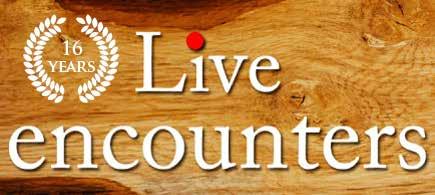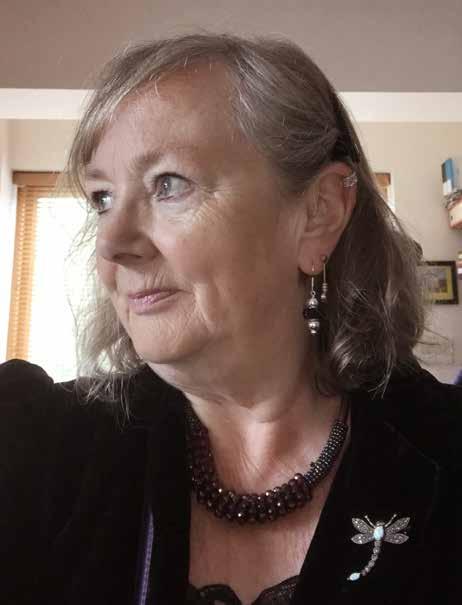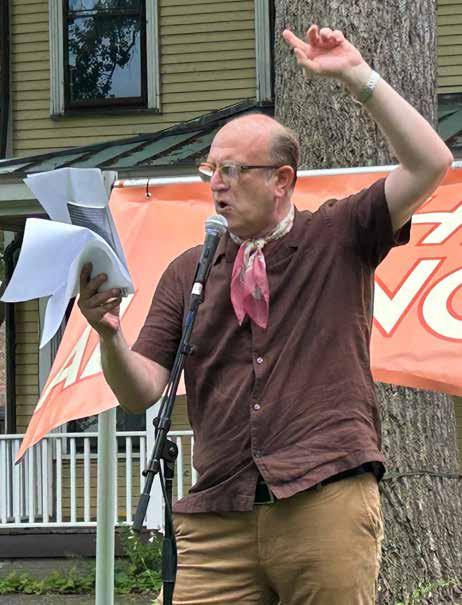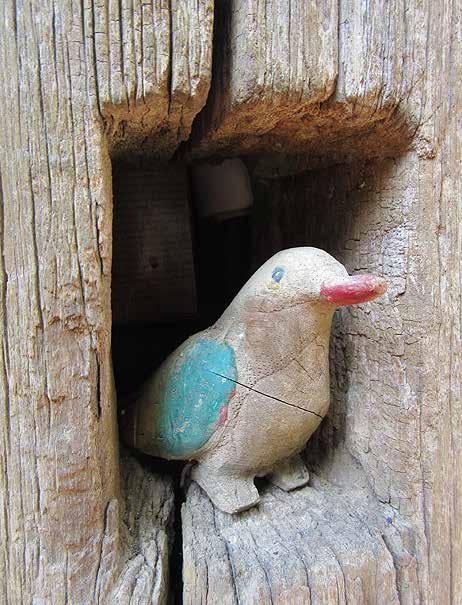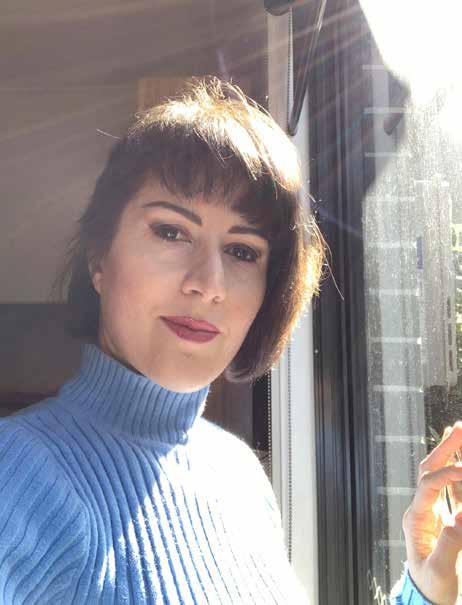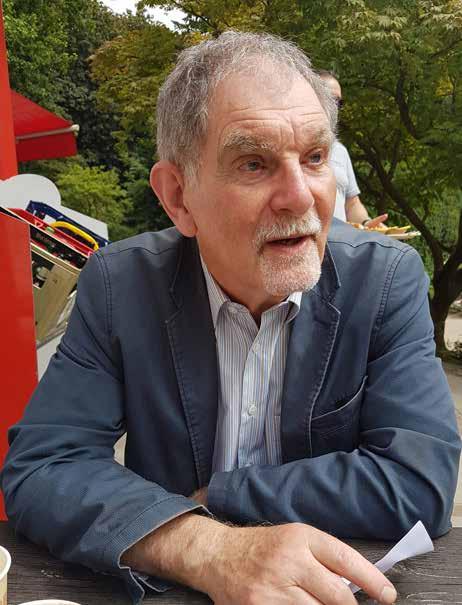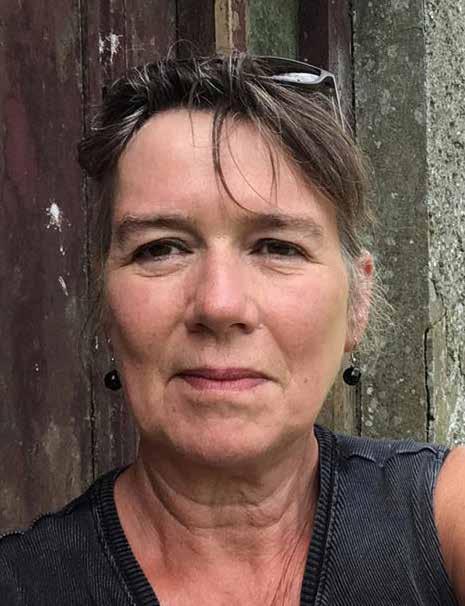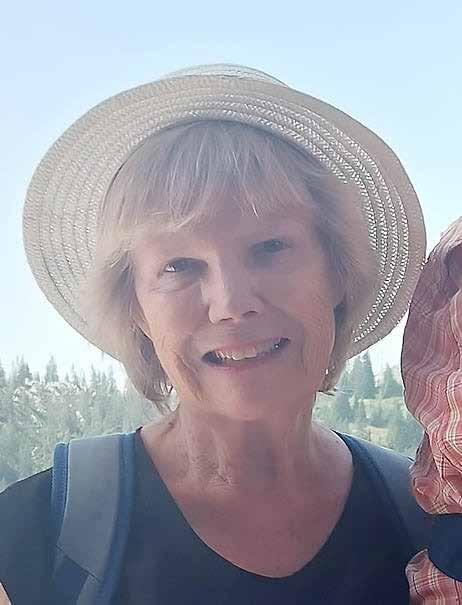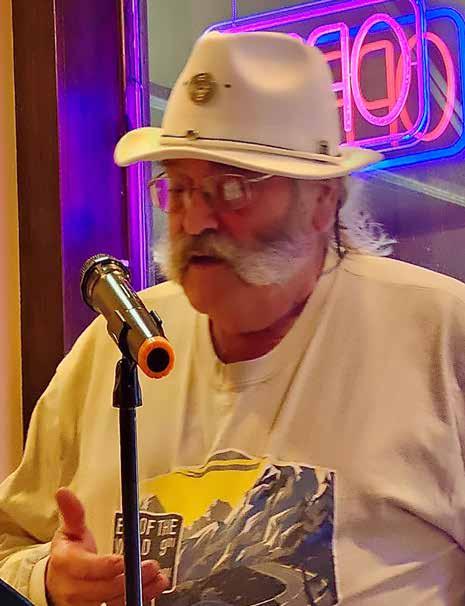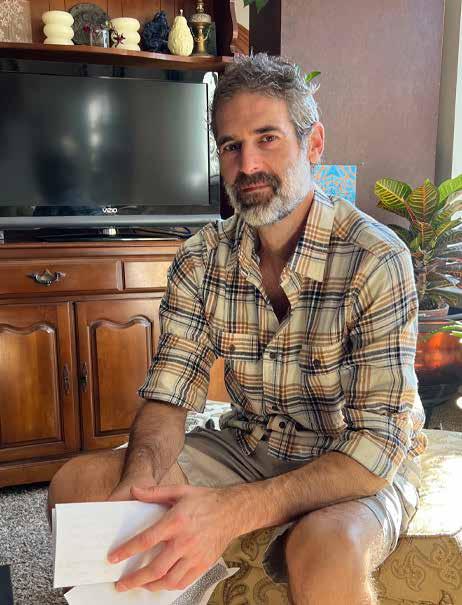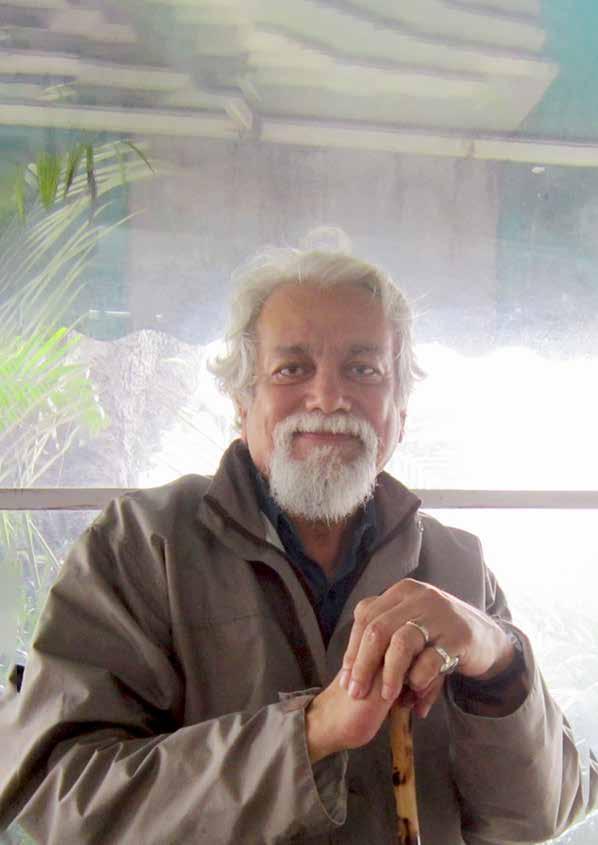Randhir Khare The Space Between A Poet’s Place
When I was eleven, my environment and circumstances brutalized me. Poetry slipped me effortlessly into its forms and norms, faces and places, voices, moods, charades and unbelievable hope and love. I became a changeling. Like the secret life below a forest floor breeds its own amazing reality I did the same. Whether I was hungry or loveless or abused or abandoned, I dealt with experiences that came my way, they weren’t challenges for me.
Interestingly, I never gave a single thought as to how I had gotten down there in the first place. Was it via a tunnel while following a ‘rabbit experience’? Did I trip and topple in? True I was into experiences of all kinds but none of them as far as I know that could have ushered me into a new and unexpected world that has grown up around me with roots connecting across the world to the Bhilalas, Todas, Incas, Bantus, Australian Aborigines…the trail runs riot and I have long since lost the singularity of the scent.
But rather than abandon it I have held it close and it follows me where chance encounters take me…like a faithful dog without a leash.
I have had the good fortune of meeting others who carry worlds within and have been continually surprised by them. There was Loy, a friend of my youth, who lived with numerous selves long before I had got wind of them. He claimed that he had a lover who was a Polish trapeze artist and who had had a child by him. In the same breath he was the publisher of a small press who constantly wrote me acceptance letters for non-existent short story and poetry manuscripts, conducted an adventure festival to Mongolia with V.S.Naipaul, Bruce Chatwin and Gavin Young and finally got abducted by four men in black in a helicopter from the Vietnam War. Saw him a month later, subdued. He later actually published a volume of poems, ‘City of Blood’ and a novel, ‘Thorns of Hope’.
When I left Kolkata, Loy remained there only to be replaced by E…, the dope smoking and bhang eating poet from Mumbai .There were worlds within him – but he was a stingy guy and rarely shared his experiences or the fantastical geographies of his spaces. Of course, he brought reports from the frontiers of his deep imagination about which of our friends were in the running for the Nobel Prize for Literature and who was due to marry an Italian. Of course there were other sundry predictions shared in sign language. When he was stuck for a plausible explanation, he would start intoning esoteric Buddhist chants and often force me to learn some by heart. I wish I had seen him more often and known him better…and read some more of his amazing poetry. With time and circumstance, we drifted apart. He had a doped out buddy whose name I can’t remember. Couldn’t find him either. Pity. Maybe there was a gold mine there. Can’t go back. Times change. I haunted the little chai shops near the temple precinct by the sea with no luck.
Not long after, crawling with the years, I had the opportunity to meet Koda Sherry who was my colleague at work. Someone had picked him off the pavement chasing under a large raincoat in the rain. It took a while calming him down till he could live up to his role as a feature writer. Of course, he just about completed his assignments but in his spare time he actually started working on a novel based on his street experiences which was turning out to be stunning. I felt myself and my own writing pale into insignificance.
It was too good to be true till one day he returned to his ancestral home in Kerala then drank and smoked himself to death. His cot which was out under the palms was washed away to sea as his family watched him go.
A hollow farewell followed with everyone getting drunk and a fight ensuing after someone made out with someone else in the nearby bushes on the beach.
I remember feeling so sick that I vomited all the way to the local bus stand. Back at my apartment I thought of all those with forests beneath their feet. Some had slipped down rabbit tunnels and were lost forever. I believe the lost poems and stories are the best and all the others that have been laboured over and polished and made ‘mighty’ have amounted to mere rabbit holes which we are left to decipher.
And so the story makers and singers still keep coming but no one knows what’s within, the forest beneath the feet. What grows there? What blooms there?
In Bratislava, before the Velvet Revolution, I had a couple of encounters with a singer-song writer- musician Miroslav. During our first meeting in a downtown café he babbled about dollars he needed to buy recording equipment. Here’s my lead singer, he said, holding up a picture cut out of an old magazine. Tia. Her name is Tia. We were children together. We would gather flowers, she liked red flowers, poppies mainly. Slowly he slipped into the tunnel in the floor of the forest and took me with him to places where he had taken Tia…carried by his words. He had the endearingly soft voice of a serial killer.
The next time around, I saved him in the same café from being roughed up by the manager for trying to run off without paying his bill. I paid and he treated me to a haunting melody on his battered guitar. This is my life. It is flooded with melodies. Original melodies. They come and they go. None of them are willing to stay. Who wants to stay at a time like this, you tell me, tell me. Everywhere there are shadows, people without faces, homes are places, no one belongs, where are you now? He walked off into the dark.
I was afraid of bumping into him again. Of course I did. A couple of times. The last was when I gave him a couple of dollars and made a dash for, panting from lane to lane, the stink of the Danube in the air, shouting, I don’t want dollar anymore. In this country we now use stones.
If anyone had guts and money, I’d recommend investing in Miro. He was a winner. A one-man enterprise.
A pure poet, the real poet is not a destination but the journey there, ofttimes straying into woods of flowers on the way, falling into tunnels, coming out, turning up in decrepit small towns and festering cities with the same sense of celebration. Many of you would say ‘but nothing is complete and in some cases, doesn’t even exist, it’s still a figment of the mind’. Unfortunately, in the world we live in everything must be complete and gift-wrapped, have a name, have a label then it can be presented to the world.
Then how do we get to the real creations? If you are interested, through your senses, just being present wherever you are. Wholly present. Compassionate listening, looking, reading. My new role as an empathetic guide helps me understand each time a young adult talks to me about what they are creating. Poems, plays, stories. Most of what they are talking about doesn’t tangibly exist but it is present and I get a regular report on progress. It gives them courage and confidence.
Poets, more often than other creative spirits, occupy the space between. For long, I too lived there. It was meanderingly pleasant, joyous and engaging. It was another reality. When I was resurrected, it was like Lazarus rising from his tomb. Very reluctantly at first. From the safety of my space to the bright scrutiny of the world. How I long to return – to the tunnel, to the connectedness of consciousness, to the tomb where all belong.
But a seed once open never gets back to its oneness. I paid a price.
The Book of Dawn: Prayer-Poems available at https://redriverpress.in/product/the-book-of-dawn-prayer-poems/
© Randhir Khare
Alicia Viguer-Espert
Alicia Viguer-Espert, born and raised in Valencia, Spain is a four-times Pushcart nominee. Winner of the San Gabriel Valley Poetry Festival (2017) with her chapbook “Holding a Hummingbird.” Two chapbooks, “Out of the Blue Womb of the Sea” (2020) and “Four in 1” (2022) are published by Four Feather Press. She has published at Panoply, Amethyst Review, Lummox, Altadena Poetry Review, Odyssey, Sin Cesar, Live Encounters, Galway Review, and Thimble among others. Panelist for “Writing from Our Immigrant Hearts,” presented at: LifeFest in the Dena Pasadena (2023), Avenue 50 Studio, Los Angeles (2023), San Diego Writers Festival, San Diego (2024), Burbank Buena Vista Library, Burbank (2024), Eagle Rock Library, Los Angeles (2024)
End of September
Summer turns dark, suddenly in this early evening hour after gray clouds shed their load softly laundering my garden.
Songs of rain, extended music playing rhythmically on roof tops do not offer consolation to the melancholic, not today.
The pelted bougainvillea faints, scarlet spills over the sidewalk, the five white arms of jasmine flowers wave good bye leaving sadness behind.
Like that wounded bird, the one I cradled in my palm, offered drops of water with my finger, my broken wings can’t navigate the stars.
About the Red Barn We Never Owned
There is nothing left from the days before the red barn, -the barn we never owned, burned in the fire; we never owned the fire either.
All that remains is the memory of voices cracked with anger, fear to expose old-time wounds, and a red moon over the Turia River watching flamingos’ anxiety build up because couldn’t fly away fast enough.
Today I return to our old home. From the window I see the burned barn we never owned but you wanted to, you wanted other things that were not me.
A smoky scent still dangles from the rigid shoulders of hangers in the bedroom closet. The transparent resilient fabric of cobwebs stubbornly clinging to my hair has a lot to teach us, but we were not teachable in those days when the barn we did not own burned.
In a drawer I find a roll of 8-millimeter film Examining the first frame over the window’s light, I see hands holding, our heads bent together with laughter as sunlight leans over your shoulder, but on the right upper corner, a dark cloud approaches.
To the Hidden One After the Flood in Valencia
I pray to understand the soul hidden in leaves, the pyroclastic voice of summer thunder, how minutes stretch into hours at sunset, why the heart of my vibrant and beautiful sister ceased to beat against her strong will, but I refuse to rub against your thighs like a dog with fleas.
In this unrelenting flood lullabies cannot be heard from the window heavy blackout curtains convulse; piano lessons, lives, books from the library, gone.
And I remember how
at night I used to extend my arms tentatively as if you were a new lover, other times I sat with palms open hoping you’ll materialize
on my hands a cluster of pearls for me to touch the smoothness of your pearliness. It’s a mystery, you and I groping in the dark.
Now waves of dread rise up to my waist as I wait for the rescue boat of assurance that you’ll stop my city from drowning.
Water keeps rising. I cannot purchase prayers in the market and the snake in the storm hisses. I should not have to beg, I’m your daughter
my inheritance rights are written on the forehead of my heart. Talk to me. Teach me the secrets of love, so, I can forgive you.
Bríd Connolly
Bríd Connolly has had poems published in Fire: Brigid and the Sacred Feminine, Storms IV, New Irish Writing, Flare: Readings from Dublin’s Sunflower Sessions and Live Encounters. Some of her poems were short- and long-listed in the Fish Poetry Competition, Anthony Cronin Competition, and Gregory O’Donoghue Competition.
Another Maynooth September
Virginia Creeper transforms from jade, emerald, malachite to flushing ruby, garnet, amber, while rough squalls sever pearly stems from entangled vines on hallowed walls, to carpet tarry pathways with fallen leaves rescuing the feet of fresh-faced students, setting them on the bejewelled corridors, towards fulfilling faith in future dreams.
First Frosts
A skim of frost on the neighbour’s roof is like a dust of icing sugar on the luscious chocolate cakes that my mother made for my birthdays, until I left childhood and started my own life.
As the sun sweeps by the chimneys a huge image emerges, like Seán Scully’s Arrest with his signature themes and tints and hints and pulse and bars of night shades bisecting yellows and browns.
Meanwhile, down at the harbour, two swans glide over astral waters, their cygnets gone from the nest, as the golden couple drift in the blue skies of the October day’s first frosts.
Marauders
Musing on lunch, what will we have, pâté, confit, terrine? we pass a wounded pigeon on a mown lawn, writhing, toiling, its ash-pale wings flailing.
Further on, three grey crows stalk and peck and jab and skip, closing in on the besieged bird.
Six eyes inspect the floundering pigeon. We whoosh them away, our arms whirling. The crows rise in a lumbering launch and then, land on our path, stabbing and gouging and watching.
We waver. Should we rescue the injured bird? Or shrug and leave it to nature? We walk on faltering, as the pigeon thrashes on the turf.
Later, when we return, after lunch, sated with our chicken liver pâté the grey crows are gone. But all that remains of the pigeon is the bloody breastbone with imploring wings.
David Dephy
David Dephy is an award-winning American poet, novelist, multimedia artist, and the founder of Poetry Orchestra. In 2025, he received the Nassau County Poet Laureate Award in New York and served as the Poet-in-Residence for Brownstone Poets from 2024 to 2025. NASA, Lunar Codex, and Brick Street Poetry sent his poem, “A Sense of Purpose,” to the Moon in 2025. Dephy was exiled from his native country of Georgia and received indefinite political asylum in the U.S. His wife and son joined him in 2023 after six years of exile. He is recognized as a “Literature Luminary” by Bowery Poetry, a “Stellar Poet” by Voices of Poetry, and an “Incomparable Poet” by Statorec. He has also been called “Brilliant Grace” by Headline Poetry & Press and praised for his “Extremely Unique Poetic Voice” by Cultural Daily. He lives and works in New York City.
In Silence
In silence, you are searching for yourself only.
Do you see the birds? They are words. Heavens are the books.
Our breaths are written in those books, by those birds, they need no explanation.
Do you see how the lovers are alone? They need no witnesses.
Birds never chase headlines. They chase horizons.
Just as passion does not fade— It reverberates.
If we could see how beautiful we are when we read each other’s breaths, we all would be immortal, just as we were in our childhood.
In silence, you feel some strange fullness, hear the voices from the other side of alone.
The Man Was Walking
The man was walking on East End Avenue and 86th Street, talking to himself:
“I spent my life believing I had control over my work, but in the end, I realized I was just another piece in the much larger game. It is not what we imagine.
Information is perception. Who controls perception controls the world— especially its past. Its history.”
The bird that couldn’t fly. Photograph by Mark Ulyseas.
©Mark Ulyseas
Elif Sezen
Elif Sezen is an Australian/Turkish multidisciplinary artist, bilingual poet/writer, translator. Her poetry collection A Little Book of Unspoken History was published by Puncher & Wattmann (2018), Universal Mother by Gloria SMH Press (2016). Her poems appeared in national and international journals and anthologies. She holds a PhD from Monash University, and currently lives and works in Melbourne. Elif’s website: https://www.elifsezen.com/
Marbles
Children notice everything others consider coincidental Secrecy is irrelevant: a burden growing by itself They pick up the quantum atoms of life as glass marbles in their hands, skillfully is this a game of yes and no or a strategy of survival?
Growing, losing their valuable marbles through wrong answers and irrelevant trade-offs
The traces of holy and maternal nourishments are lost The soul is in hunger, its light is fading away it is thirsty, suffocating, but cannot figure out what it is searching for and what it is absent of
Growing, that deserted tunnel where something human compassionately awaits some surrender of the small self
Elsa Korneti
Active in organizing readings and events with other poets, Elsa Korneti was born in Munich, Germany, but grew up in Thessaloniki, Greece where she still resides. She is a Greek poet, essayist and poetry translator from English, German and Italian. Her career has been similarly diverse: studies in finance were followed by work as a journalist for well-known newspapers and magazines. She has published poetry, short stories, essays, book reviews and translations. She organized several successful poetry slams in her city and in Athens; she inspired and organized events, and staged original poetic performances. She has published sixteen books of poetry, short stories, essays and translations. In the recent years two of her poetry collections and one short stories collection have been distinguished as shortlisted for the National Award. Her poetry has been translated into several languages and is also featured in various foreign anthologies and magazines. Recent publications: Poetry, Homo Aquarius (2024), Short stories, Rooms with teeth and other sharp stories (2023).
In An Indefinite Horizon
In a blue infinity, Where the gaze Rests calmly, The little cormorant plows His sea field. Then he dives For the first fish Of the day. The rower Balancing, Like the bird on the branch, Struggles to tear The calm water, Moving his world Rhythmically. The world, busy, For the persistent rower, Ignores him.
A Dog’s Sleep
The dog Lives his black-and-white life. But in his dog’s sleep, He dreams his own dreams, Which may be in color. Then he jolts, In the serene sleep, Startled.
Love
Everyone loved him From a distance, The one so happy. Everyone loved him Persistently, the one so happy Who stoically endured The hammering of love, Remaining, in the end, Demonic, Empty.
Garden
The whole world Should be An amaranth flower, A garden, Embedded in the mind Of the robin. He holds, in the secret garden, The key to childhood, For the robin Is an anarchist bird. It accepts no orders From anyone Except From itself.
Tree
The tree Shakes its leaves, Bushy and ambitious, Full of prophecies, Juices, and graces. From its last branch, Suspicious Of the coming storm, Hangs a fruit, Rotten.
Helen Dempsey
Dublin-born Helen Dempsey lives in Rush, Co. Dublin and has had poems published in anthologies, magazines, online, local radio, readings and open mic sessions. She won Fingal Libraries’ Poetry Day competition 2018, 2021; a commended and highly commended award in the Jonathan Swift Poetry Competition 2017 and winner in 2023. She was shortlisted for the Bridport prize, 2018 and 2023. Most recently her poems have appeared in Live Encounters, A New Ulster, Flare, The Storms and The Ireland Chair of Poetry Commemorative Anthology, Hold Open the Door. A member of the Ardgillan Creative Writers’ Group, she holds a Masters Degree in Poetry Studies from D.C.U. Planting a Pear Tree her debut collection was published by Revival Press in 2024. www.limerickwriterscentre.com
White Noise
Hearing aids heighten background chatter (I know there is an app there always is).
Time has robbed me of a quiet place somewhere to be, a sensory garden soothing sounds scratches of ballpoint on paper. But no.
Let me appreciate the noise, the hearing.
Listen for the tone of angst, grief, exhaustion, pleading in a vacuum of busyness shouting in a space bubble where no one takes notice afraid of hearing too much.
When I Forget You
(for E.K.)
They are my arms around you when you embrace me. Your kiss is on my lips. They are still my eyes though my blank stare upsets you.
My mind is not all of me, I’m still here.
When you hold my hand, it is the same one on which you put a ring. Our children are part of us. They have traits, gestures, sounds I once showed, made, said.
When I forget you, think of our young love, the better not the worst, the health not the sickness, the richness of all we have cherished.
My mind is not all of me, remember for us.
Garden Stage
He watches there often; on the fence post, possessor of his territory.
Wary of the artificial hawk circling the limit of its tether.
The oystercatcher cries desperately caught between the fence and escallonia hedge
in its panic it cannot see a way out. The redbreast utters siren notes
messages from a visiting soul. Reassurance for family lore, flutters. The oystercatcher registers its escape
Ian Watson
Ian Watson is originally from Belfast but lives in Bremen, Germany. He is the author of two poetry collections in English: Riverbank City (Blaupause Verlag, 2013) and Granny’s Interpreter (Salmon Poetry 2016); a further collection Somewhere, Far Away, a Radio, is forthcoming. His poetry has been published in anthologies in Ireland, Britain Germany and the United States, and his recent German-language non-fiction includes Spielfelder: eine Fußballmigration, on football and identity, and Bremen erlesen, a literary and cultural guide to his second-home city in Germany (both with Edition Falkenberg). He also publishes translations of poetry from and into German and English. He has worked regularly for radio and also made the film Cool to be Celtic for German and French television (arte 1999). He has completed his first novel, East Antrim (working title). He is a steering committee member of the Literaturhaus Bremen.
THE LAST SUPPER
In the Cathedral Museum, Bremen
Thirteen colleagues round a groaning table; the gaffer is eating what looks like a cat. The traitor with the very prominent nose prays ostentatiously. The bread of treachery is passed from hand to hand from an oval dish.
The decent squeak of smooth oak floors, designer lighting, hushed and reverent tourist chat; a smattering of Russian or Ukrainian. How plain all this must seem to someone orthodox.
No mediaeval smell, no draughts, no damp, a volunteer guide who talks to everyone a polished dagger beyond stainless glass shining rustless steel from a time when nothing ever stayed stainless
The crypt is hidden, as a crypt should be cold oozes from the floor to my left in the rock wall an electric socket
Warm brown and orange candles trams rumble from afar the orange and brown of the bishop’s clothes what were the original colours?
An elderly volunteer with a farting shoe replaces the candle. Taking notes, I hear him return.
THE CHAIR
‘The barge she sat in, like a burnish’d throne …’ (Antony and Cleopatra, II, ii, 190) ‘The Chair she sat in, like a burnished throne …’ (The Waste Land, II)
The chair she sat on, like a lean great aunt, sits straight-backed, tight-lipped and spindly-legged; its features are gaunt, its tone disapproving of a story it will never tell.
The sofa she chilled on, like a stranded whale, gasps briefly at him, creaks as he passes, oozing bereavement, leaking loss.
Books she never read, like bookends of themselves, whisper their titles in the shelves: Flesh and Blood, After You’d Gone, An Evening of Long Goodbyes, The Sense of an Ending, Paradise Lost.
Bottles she drank from, like bowling pins, clink dustily together at the breeze-kissed curtain, trapping the light and bending it green, certain of nothing but the bottle bank –wishing for it just to be over.
Enduring Love, like an oblong coaster, still lies on the wicker stool, bookmarked halfway, red wine on the cover.
Remote
Up, out on the Mournes it was just him and the sheep Now the whin is dark and rainswept There is a whistle in the chimney
Once a week to Tesco’s in the Fiesta and pick up the Social Security Newry and Belfast for clothes and bigger stuff
He had noticed her growing aloof her constant trips to ‘Out’ in the Mini Was that business with the ewe the start of it
Her indifference grew into distance The week with a girlfriend in Hull a weekend with her sister on Inishmore
When he called round the neighbouring farms to ask the farmer’s wives if they’d heard some were standoffish, some didn’t come to the door
He looked for her everywhere: in the next-to-one village pub in the ladies’ toilet of the Loyalist Working Men’s Club behind and before the counter of the nearest Food Bank He cross dressed into a meeting of the WI, appealed to the audience at the Country Women’s Guild
In the end he even stuck his hand down the back of the clapped-out chesterfield
Intensive Care
Somebody stole his umbrella in the waiting room.
He’d only been with her a quarter of an hour; she was easily tired but her responses were good. She could now not only just shake her head, but nod; no mean feat with that long neck scar.
There were five of them, before and after. Were they all there together, stuck on standby for the same news from inside? Or had they got to know each other in a parallel wait?
When he saw it was gone (he’d thrown it casually into the corner when the intercom said he could go through), he asked of course, but nobody …
They must have taken it by mistake, was all one lady could say – the one who claimed he’d taken it in with him. No, he didn’t (the one who could have been her daughter): In the corner – there, against the wall.
Outside, it was pissing down loud and hard and vertical, bouncing off the pavement as he hiked up his hood.
As he crossed the forecourt in a rotting vegetable mood, he too was gathering beasts: of revenge – and none of them verbal.
If they’d nicked it and he’d caught them with it sitting in the visitors’ café, they would have been in A&E or back up to Intensive Care post-haste.
But then: if it had been inadvertent, maybe if they’d received bad news in here, he just hoped they wouldn’t be standing soon under a red-and-yellow checked umbrella at someone’s open grave.
Irina Frolova
Irina Frolova lives on Awabakal Country in Lake Macquarie, NSW with her children and fur babies. Irina’s work explores life and belonging through cultural, feminist, psychological, and neurodiversity lenses. Her creative highlights include her poetry collection Far and Wild (Flying Islands, 2021), the second prize in the 2021 Deborah Cass Prize for Writing, and poems recognised in the 2023 University of Canberra VC International Poetry Prize, the 2023 Heroines Women’s Writing Prize, the 2024 Liquid Amber Poetry Prize: Poetry of Change, the 2025 Poetry d’Amour Love Poetry Contest, and winning The Australian Haiku Society 2025 Autumn Equinox Kukai competition.
Untouchable
We skype with my family. Babushka calls you darling boy and Мишенька.
The name lands softly like a wish on a dandelion.
Here, the space left for me dissipating, I hold my breath whenever I spell my name to a stranger.
I turn to you, who sees the unspeakable, the (under)current, holds the untouchable.
Your hand on mine, we sigh— in this moment, free to exhale.
Note: Мишенька – Michael
Leaf Angels
I believe nothing will remain of us but this moonlight on the lake’s ink a twinkle of wonder in the dark eye of night an indigo shimmer where the horizon rests undefined & indefinite and by this I mean nothing but song whirling in winter’s air over the silhouettes of birds
nothing will remain in the way but this
silk of the spider web quivering with drops of rain where the sun sifts through the tangle of trees and by this I mean something like chaos
growing evergreen in the rustle of yesterday’s leaves
dry with grief we can burn or fall
arms flailing leaf angels in love
and by this I mean everything
Julian Matthews
Julian Matthews is a mixed-race poet from Malaysia. He was nominated for the Pushcart Prizeby Dream Catcher magazine/Stairwell Books, UK, in 2022. He is published in The American Journal of Poetry, Beltway Poetry Quarterly, Loch Raven Review, Live Encounters and New Verse News, among 60 other literary journals and anthologies in 17 countries. https://linktr.ee/julianmatthews
Footnote
If I wrote a poem about you
There would an asterisk at the end of every line
Each will shine like a tiny dark star at the edge of the universe
Each will lead you to a footnote explaining the ambiguity of sadness from your absence
My poem can’t, won’t, will not stand on its own or be self-explanatory
Your questioning eyes will dart up and down the page from asterisk to footnote:
line-asterisk-footnote, line-asterisk-footnote, line-asterisk-footnote
Trying to make sense of it all
Until you reach the last line which wouldn’t need a footnote
Because by then you would understand
That you are gone, no longer here, unalive
And all that remains is this grief
And your unexplainable presence still kicking around and footnoted in my life forever
Sunday Encounter
This Sunday evening, I briefly encountered Hope and Peace. I was out for my usual three-mile walk around the park.
“Hope” was in bright yellow font on a t-shirt of a buff young man, huffing from a workout, on the right side of my path.
“Peace” was in dull white lettering on a faded t-shirt of an older woman on my left, who looked harried as if in a rush to get home to prepare dinner. My journalistic instincts kicked in and I thought of capturing the moment on my phone.
After all, it is not everyday you are confronted by Hope and Peace. But it was already too late and too obvious.
So I just looked quizzically at one, then the other, and they each looked quizzically back at me – for staring. And since they were parallel to each other, neither knew what the other’s t-shirt bore.
I do not consider myself a spiritual man, and have grappled with my faith for decades, but somehow felt lighter today for the coincidence. A stressed, aging Peace, and a muscular yet tired Hope came up the road and the universe winked at me. And I realized, not a thing in this weary-shouldered world has changed in centuries.
Stubbornly, denying humanity’s fate, I walked an extra three-mile round.
The Baker
i sprinkle flour like stardust, press and mould this ingrained pain into a pliable dough i can bear
each of us is an untested recipe waiting to mix it up, improvise, share our unleavened, salty souls
we fear the burn yet stir and churn, measure out the weighted repercussions, butter the beaten batter, stuff the ovened hurt
sometimes the crust hardens, cracks start to show, the temperature’s too high–you can’t preheat a woodfire heart
yet, i persist: my webbed words knead this gossamer interplay, spread sugary crumbs to draw you into this messy galley
i am not sour, though – just slather me up, melt the cheese, raise a toast, let’s be open to whatever sweetness may come next
Kate Ennals
Kate Ennals has published poems and short stories in a range of literary and on-line journals (Crannog, Skylight 47, Honest Ulsterman, Live Encounters, Boyne Berries, Stony Thursday, Crossways, The Ogham Stone, Poetry Ireland Review, plus many more). She has published three collections of poetry. At The Edge (Lapwing) was published in 2015. Threads (Lapwing), was published in April 2018. Elsewhere (Vole Imprint), in November 21. Her fourth, Practically A Wake, will be published shortly (Salmon Poetry). Her blog can be found at https://kateennals.com/.
The Birdcage by my Bed
For Lesley
It came filled with wild, white plastic flowers but now I have stuffed my birdcage with pink sunrise, blue sky, brown, muddy estuaries and vast green oceans. Strands spill out through its narrow grey bars, all broken creations. Caged like this, they vie for space a mass of mohair, alpaca, angora, arran, merino every thread knotted, twisted, and tangled no longer the colour coded, matched, pristine balls of chunky lined up in a wondrous display full of temptation and desire. Instead, they are looped, disordered fibres, damaged dreams entwined with bright coloured nightmares. Ideas gone hideously wrong. Yet still, each one holds a vestige of hope, of becoming… something a round, a row, a part of a whole in the world.
Mary Scheurer
Mary Scheurer lives by the Alps and derives immense joy from the astounding nature that surrounds her. A retired Philosophy teacher, she integrates two active poetry groups: ‘Poetry Quartet’ (with Jim Burke, Carolyn Zukowski and Peter Wise) who have read at the Limerick April festival ... and ‘The Leman Poets’ whose recent 25th anniversary book - ‘In the Half Light’ was published in summer 2025.
Sheherazade
A willing suspension of disbelief.
The Earth is flat. At least that’s one version, battered by mallets to a thin paper pulp fine as tissue paper, holes and rips appearing faster than lies and confusion can be spread.
It used to be round, (the other account) as Aristotle found centuries ago, or as Magellan confirmed when he sailed past the edge and didn’t fall off.
Now it resembles a Persian rug, yet stripped of its enchanting and well-woven designs. God knows what has been swept underneatha flying carpet even Aladdin can’t control. To save ourselves from becoming unhinged we cling to the fringes so we may delay the fall.
Scheherazade spins many yarns to her sultan charms him into sparing her life. Such skill, such thrilling cliff-hangers every night. He waits with bated breath for every next chapter.
Here, on our flat/round Earth, confused, though far from spell-bound, we dread each coming episode; we may never know the end of the story, better that way perhaps.
Residue
Fossilised nests of Potter wasps trace graceful patterns as we wander along the coastal path. These insects, now extinct here, leave their mark, so not completely gone. We look and wonder.
Below, the sea speaks and gulls cry as they glide effortlessly above. Love of the ocean swells and ebbs. And my father’s voice seeps through spume.
A favourite song:
‘I must go down to the seas again …’ Focus.
‘A wild call and a clear call’ All of it comes back. In the front room, my sister at the piano; melody and lyrics etched in memory.
A lone egret
strikingly white against black volcanic rock, shocks the eye. My father’s hair was light, eyes pale grey. He aspired to the tones of some great tenor: Caruso, Gigli and such yet his form was lean, like the bird’s. Elegant in spirit, lacking clout, outdone by feeble heart and lungs, ever reaching for those sky high notes.
The melody runs on to closing lines:
‘And all I ask is a quiet sleep And sweet dreams When the long trick’s over’.
Surf seethes and foams pitilessly. Time ticks on.
Sing, Teddy
Teddy swims through veins melodies charge bloodstream Sostenuto
Teddy swims troubled currents weathers waves salt spittle softens Moderato
Teddy swims calm strokes sure to shore groove soothing Andante
Teddy swims smooth, humid wet words skin caresses Glissando
Teddy swims stabs surface blur staccato strokes piercing Pizzicato
Teddy swims hastening pace upbeat brace heartbeats race the tempo, chase it Crescendo
Teddy swims think of him ever bear-hugging back
Mancando
Teddy swims think of him drowning not waving flailing Fine
Maurice Devitt
A past winner of the Trocaire/Poetry Ireland and Poems for Patience competitions, he published his debut collection, ‘Growing Up in Colour’, with Doire Press in 2018. Curator of the Irish Centre for Poetry Studies site, his Pushcart-nominated poem, ‘The Lion Tamer Dreams of Office Work’, was the title poem of an anthology published by Hibernian Writers in 2015. His second collection, ‘Some of These Stories are True’, was published by Doire Press in 2023.
Spring
We know it’s arrived, when the neighbours clamber, bleary-eyed, from the bunkers they’ve been living in all winter and we have a rollcall on the street, watch as friends declare themselves safe from the vicissitudes of the confined domestic bliss, take note of the unexpected silences, the faces that are missing. A man from the council, whose brother I knew in school, proceeds to check our health and fitness, interrupting his notetaking to pepper us with news and weather highlights he thinks we might have missed, unaware perhaps that our wifi is at least as good as his. He climbs back into his van, and we start to re-acquaint ourselves, share what we watched on Hibernation TV – moose migration, a particular favourite – fix our gaze on the summer months, as though we believed every choice was ours, focus on the little tasks that make us happy, keep us distracted, and all the while we are thinking of the sea, whether it has inched any closer.
The Night You Died
That afternoon I followed my usual Saturday routine: immersed myself in the match day commentary on BBC 2, the distinctive burr of James Alexander Gordon, his predictive rhythm pitched perfectly as he unveiled the results. Juggling the scores in my head, I scurried up the stairs to your bedroom, pouring them out to you before they were lost, yet failing to notice you were already slipping away. The following morning, I woke early, lay still and noiseless in my bed, listening for the unfamiliar sound of visitors staying over, the muffled clip of their heels on the lino floor and the soft voice that would peel up the stairs, call me down to a kitchen filled with faces and few words, just enough to tell me what I somehow already knew.
The Origins of Fame
You lived in the most mysterious house on the street: squat and assertive, with just one wink of a window facing on to the road, as though throwing an eye up the sweep of newer, less distinctive houses. Hunched around a garden of black apples and white plums, distribution of the trees based on a puzzle plucked from a Lewis Carroll book you had never read. The puckered front door, wedged into the deep stucco wall, forced even the smallest of us to stoop into the cavernous dark, layout deliberately unfamiliar, rooms just fulfilling the purpose of concealing other rooms, the phonogram in the corner playing Steve Hillage on repeat, light never bright enough to recognise ourselves, as we halfexpected a Brontë, or two, to walk through. On quiet days, the echo of last week’s drum practice seemed to hang in the air, the snare drum always a sharp rebuke to those of us expecting the comfort of tea and scones, so it was perhaps no surprise, when you arrived breathless, on the green that day and proceeded to tell us about finding a moose’s head in the attic. This is where the escapade began.

Michael Simms
Michael Simms is an American poet, novelist and publisher. He is the Founding Editor of Autumn House Press and Vox Populi Sphere; and the author of five collections of poetry, six speculative novels and a textbook about poetry. His poems have been published in Poetry (Chicago), Scientific American, Plume and Poem-a-day (Academy of American Poets). Simms grew up in the cowboy culture of Texas, but since 1987, he has lived with his wife, the philosopher Eva-Maria Simms, in the historic neighborhood of Mt Washington which overlooks the three rivers of Pittsburgh. Simms has won awards for his environmental activism, and in 2014, Simms was awarded a Certificate of Recognition from the Pennsylvania Legislature for his service to the arts. continued overleaf...
Sotto Voce
In the slow season of changing colours with pavements carpeted in gilded leaves parks, woodlands - radiant in autumnal light rivers and streams meander quietly as if gathering time and everything changes shape.
Days usher nights into darkness with more urgency and almost unnoticed his mind begins to slide into the dungeons of memory where alone he must battle the terrors that rise from their annual slumber to taunt.
Shutting the world outside, he slumps each evening in his chair waiting patiently as he knows he must for come they will spreading their tentacles their venom coursing his veins like iced blood feeding the desolation.
His mind screams into the stillness body recoils - crumbles into the abyss for he knows the darkness has begun and in a quiet voice he capitulates knowing that his time in melancholy has begun…. again.
The Line
For a young Palestinian girl, aged 9 Lest we forget.
Herded between makeshift barriers two – three abreast shuffling forward towards the white tent – in the distance one could be forgiven for imagining it were a queue for concert tickets.
The tent, clearly marked – top and side with a red cross distribution point for medical and food supplies to a destitute people, waiting days for relief - for food the currency of life in a war plundered land.
A young girl, clutching a red plastic bowl to her fragile body –with both hands wide eyed - her arid skin hanging lifelessly to her protruding bones – the way rags might hang on a branch to dry.
Invisible to the world (to all but herself). A scowling bark beckons the line to keep moving forward – toe to heel inch by inch - weaving a crescent shape agonisingly listless - edging ever closer.
Suddenly, the puncturing wail of gunfire rapid exchanges –screams and cries –the line breaks, the young girl – alone drops to the ground, dust scatters and a red plastic bowl blows with the wind.
Rachael Stanley
Rachael Stanley is from Dublin. She has been published previously in Live Encounters and in many journals and anthologies, most recently in Drawn to the Light Press, issue 15 and Flare 25. Her first collection Back to Infinity was published by Revival Press in May 2024 and received favourable reviews.
Clematis
Each April they flowered sprouting into pink magnificence trailing the old wooden fence till the wind rose and pushed with gale force strength.
Little by little, the fence kept tilting till it collapsed under its weight like a beast burdened with a heavy load. Admitting defeat in the face of continual storms, we dismantled the fence and cast the flowers aside.
Farewell Clematis dressed to your best in glorious pink and hiding the oil tank now fully visible in its urban ugliness.
Yet, years later at a different spot Clematis has sprung up once again leaning over in abundance from a neighbouring garden, as if these harbingers of spring insist on returning.
Distractions
Go full Lidl this summer the ad blasts out from my tv screen and the words this summer catch me off guard prompt the question how many more summers do I have?
What day of the week will it be? What year?
Will I be calm or fearful? Will I feel ready or unprepared?
Avoiding these questions I revert back to the fleeting ad, as I get side tracked by Facebook, by Instagram by people shouting abuse at each other on X as I go full throttle into an abyss of twenty-first century d i s t r a c t i o n s!
The Dream Catcher
i.m. Martin Luther King Jr.
In the pain of his people he envisioned a different world. Now I pray that we invoke his spirit as we witness the nightly bulletins of destruction. For he followed the dream like a dream catcher releasing its feathers into the light.
Ray Whitaker
Ray Whitaker has five books published, and two chapbooks. His work has been published in thirteen different countries. He’s working on two new manuscripts now. Ray was a Delegate to the 2024 and 2025 Writer’s International Panorama Festival. He participates regularly with several zoom poetic events worldwide. Among them, he has been spotlighted on a US National Poetry broadcast from Quintessential Listening Poetry Online Radio In April, ’24; and also an International Poetry Recital hosted by The Fertile Minds out of India this past April 19th, 2024. In July od 2025, he has been the featured poet reading in David Leo Sirois’ Spoken Word Online, associated with Spoken Word Paris; and a featured poet for the Chicauga Arts Festival, in Plamer Lake, Colorado He is Moderator for Michael Lee Johnson’s FB “My Voice,Your Words- Poetry In Action” page; and an Editor for Masticadores Canada Journal.
Only So Much
The crickets sound so optimistic. They still tune their instruments at twilight, evensong. They fill my ears with their chorus of yeses, sighs, maracas. The crescendo and then, en masse, diminuendo. Virtuoso phrasing, offbeat percussion in the grass. Crickets stand in for a nightingale, and the sun goes down on the earth.
A Boisterous Act Of Explanation
Wondering how the puzzle pieces would fit if there was no illustration to model on long shapes, multi colored tabs that don’t quite go.
Woke up hungry nothing, and everything to do with food hungry for interactions and avoiding tasting a bloody lip the fork sliding into the entree an appetite from dreaming of that, that is possible the voraciousness in a table setting a carving knife held in eager anticipation, salting the portions. Thinking ahead to the how of it contemplating the why of the spoon placed on the left.
Those conversations around the dinner table a boisterous act of explanation intervened with God’s words as he chews on a drumstick, the phone rings that conversation stopped for a second or two electronic trumpet ringtone a fanfare ignored this feast more important than anything outside of it. The long table is vibrant with people. God too, making points gesturing with cutlery and bones no spilt wine tonight.
Petroglyph
High up on a canyon wall a long panel of sheer desert lacquer inscribed sunshine just breaking thru illuminates the symbols there.
Leaving us to wonder those man-like figures bring questions to we moderns standing sententials for a thousand years centurions now for lost meaning a two dimensional showing the rock face hammered so long ago perhaps by the artist of that Clan who, like all artists was little understood by the rest of his clan, who were only concerned with the next meal, or the children.
A way of well-being placed just so, not perched on a wooden ladder leaned on a cliff face drawing a male figure for time to interpret.
Mesa Verde, Colorado, Usa - Constructions by Native Americans circa 1200 years.
Photograph by Ray Whitaker.
©Mark Ulyseas
© Ray Whitaker
Scott Thomas Outlar
Scott Thomas Outlar originally hails from Atlanta, Georgia. He now resides and writes in Frederick, Maryland. His work has been nominated multiple times for both the Pushcart Prize and Best of the Net. He guest-edited the Hope Anthology of Poetry from CultureCult Press as well as the 2019-2023 Western Voices editions of Setu Mag. Selections of his poetry have been translated and published in 15 languages. He has been a weekly contributor at Dissident Voice for the past 10 years. More about Outlar’s work can be found at https://17numa.com/
Titan’s Noose
Three cyclops in the forest one vision triangulated with eyes closed, the signal unfurls a mighty ruckus
Melee in the viper pit
Above us, vibrating wings the hum of orioles hymning their way through the wind
A gentle breeze cusp of spring in its sendoff surrendering to summer
Octave bellows the waves moon pulse, tide bereft of calm or comfort
The teasing lane of resilient sails approaching confusion of contusion capsized, brittle thunder
Pulse Electric
dust of seven ages squeezed like fresh daisies with centrifugal gears itching as scratched platitudes in sore eyes sordid sight, first rhyme I digest tonight and fade one degree deeper into a feeling of comfort two shades off the beaten path of numb tingling and wizened orbit
a leaf, fluttering, freefall enter the wishing well of dandelion portal
now ripped through the great divide neuron cabinet whips out archaic relics and recipes
stir up divergent opinions in the pot while vultures and ghouls point shadowy fingers
if you learn to grow through disillusion the jeweled net of contentment stretches out wider during novel periods of arcane virtue
as all the perching peacocks of inverted righteousness slip from precarious angles of moral hypocrisy
crumbling into the heap of virtuous stones they’ve been tossing over the spit-stained ledge
tear ducts barren cut with shattered glass sands of cultural hours turned over, spilling tide on tip of tongue dots trace blood taste of change and copper sizzle
Shantanu Ray Chaudhuri
Shantanu Ray Chaudhuri is either an ‘accidental’ editor who strayed into publishing from a career in finance and accounts or an ‘accidental’ finance person who found his calling in publishing. In 2017, he was named Editor of the Year by the apex publishing body, Publishing Next. He has edited leading authors in India, and books he has worked on have won a number of National and other awards. As an editor at HarperCollins and Penguin Random House, he has published and edited some of India’s leading poets like Gulzar, Joy Goswami, the collected works of Keki Daruwala and Dom Moraes, Ranjit Hoskote, Amy Singh and others. He is also the author of a book of poems, Whims, published by Prof. P. Lal’s Writers Workshop. His poems have been published in The Yearbook of Indian Poetry in English in 2023 and 2024. He writes on music, films and books for a number of platforms and on his website https://shantanuraychaudhuri.com/.
What the Star Meant
after Rilke
If only the world would hush –this raucous turning of wheels, shouting neon, sirens chewing the dark, the endless cough of the city’s breath.
Then, perhaps, I could hear what that star – yes, that one –tries each night to murmur through its patient trembling.
It leans close, I know it, daring the veil of smoke and sorrow to part for a moment, to let its silver syllables fall through.
But the noise here is thick with forgetting. Even silence is crowded, and the skies are smudged like old parchment too often rewritten.
Still it persists, a single vowel of light, spoken again and again into the unlistening void.
I want to become so still I might once more be sky.
And in that sky, the star, at last, would speak.
The Cow That Lives By the Gita
There she sits, a slab of calm in the molten fever of the noon, the sun hangs like a question and she, with flies haloing her flanks, offers no answer.
Rickshaws groan, brakes squeal, horns bleat like goats in existential crisis, and yet her eyes, half-lidded, ancient, gaze somewhere beyond eternity.
A pack of dogs erupts snarling, teeth on the cusp of narrative, they lunge, bark, circle. She does not flinch. The dogs retreat, confused by such impenetrable indifference.
Traffic divides like a river meeting stone. A man on a scooter curses, a child waves, someone takes a photograph, the world moves around her.
Not of it. Not against it.
A creature neither rushing towards nor away.
The Gita spoke of this, to remain as untouched by praise as by the sting of insult. To feel neither the fever of arrival nor the chill of loss.
She lives that ancient text wearing the wisdom of the uncluttered.
Not apathy, but a stillness earned through a million monsoons of becoming.
Be like her, says the wind that parts for her. Be the unmoved in the moving world. Sit in the centre of the road, and let life learn how to pass, even as you learn how to let life pass by.
Tim Tomlinson
Tim Tomlinson is the author, most recently, of Listening to Fish: Meditations from the Wet World. Other books include This Is Not Happening to You (fiction), and Requiem for the Tree Fort I Set on Fire (poetry). He is the director of New York Writers Workshop, and he teaches in New York University’s Global Liberal Studies.
Egypt
I knew a man who’d spent a lot of time in Egypt. He liked people to know that about him, that he’d lived there, in Egypt. That he spoke Arabic, got into scrapes, over legal issues, civil issues. In Egypt. In Egypt he’d been both plaintiff and defendant.
You might not know this, he’d tell you, but in Egypt they wipe their ass with their hand. Their left hand, always the left. Never shake an Egyptian’s left hand, in Egypt or elsewhere, he’d say. Best to keep that as a general policy, no matter where you are. And to remember: if an Egyptian offers you his left hand, well, you, sir (or madam), you have been insulted.
As a guest at dinner parties, not in Egypt but in Manhattan’s Upper East Side or Long Island’s East End, this man would bring and conspicuously place an aluminum bottle alongside his setting at the table—the left side. It resembled a thermos, a plain unadorned gunmetal silver cylinder.
Excuse me, the guest to his left might at some point inevitably say, I’m wondering about the, um … thermos.
Chuckling, this man who’d spent a lot of time in Egypt would explain, No, no, no, that’s not a thermos, you see. It’s an ah-BREE.
That’s the way he said it: ah-BREE.
To which the guest might reply, Oh. And exactly what is an …
ah-BREE, the man who’d spent a lot of time in Egypt would say, tapping a napkin to his lips. Do you know, the man who’d spent a lot of time in Egypt continued, that I’ve spent a lot of time in Egypt? Ah, of course, you don’t know, how could you know, unless you read the papers, or the journals, or visit the bookshops—the good bookshops, mind you, not the ones with the drugstore fiction and the faux-histories by desk-bound academics. I’m talking about the real bookshops, the ones that stock the hefty histories, the from-the-field accounts that test scholarship against lived experience.
Adding, almost as an after-thought, Such as the several I’ve published.
About Egypt, I’m guessing, the guest might say.
Indeed, the man who’d spent a lot of time in Egypt would say, Egypt. And you see, over there, in Egypt—
and this is the part where the man who’d spent a lot of time in Egypt would inform the stranger about Egyptian practices of post-evacuation hygiene. The ah-BREE, he’d explain, contains water, room temperature to warm. When you’ve concluded your business, you reach for the ah-BREE — with your right hand. Then you pour warm water into your left, and you ablute.
So no toilet paper? the dinner guest might say.
Toilet paper! the man who’d spent a lot of time in Egypt would exclaim. To an Egyptian, to half the world for that matter, toilet paper doesn’t exist, even the idea of toilet paper. It’s nonsense. American nonsense. Like dog food. You want to feed your dog, you scrape your plates. You want to wipe your ass, you use your hand. Your left hand. I’ve seen some fool Americans coming out of restaurant bathrooms in Egypt with puzzled looks on their faces and water dripping from their right hands. Their right hands! Fools! And of course, the diners (this is especially true in Cairo), the diners are too polite to call attention to the faux-pas. They might look away and generally provide a wide berth, as if to say, let him or her through, and get them the hell out of here as quickly as possible.
And burn the silverware? the guest might say.
The silverware, the dishware, the tablecloth and table, the man who’d spent a lot of time in Egypt would add. But as I say, the left hand, always the left, and water from the ah-BREE. Followed, of course, with a rigorous soapy scrubbing of both hands, with particular attention paid to the left, especially around the fingernails.
Here, palm in, he’d hold up his left hand for the guest’s inspection. At each fingertip, the barest sliver of white nail edging the flesh.
To the quick, he’d say. For obvious reasons. Those on the right hand you can leave like the fingernails of a Chinese emperor.
If pets were allowed at a host’s home, the man who’d spent a lot of time in Egypt liked to bring his dog, a brown Labrador named Mwt (pronounced “mwt”). Mwt was a wellbehaved dog who’d curl beside his master’s chair and wait quietly for a scrap. People would comment on his excellent behavior and inquire after his name.
The man who’d spent a lot of time in Egypt would say, Oh, him? Allow me to introduce Mwt, and the dog’s ears would lift.
People would say, Mutt?
No no no, the man who’d spent a lot of time in Egypt would say, Mwt. M-W-T, Mwt.
Oh, what an … original name.
It’s the pronunciation, the man who’d spent a lot of time in Egypt would say, of the ancient Egyptian hieroglyph for phallus.
You don’t say, people would say.
I do say, the man who’d spent a lot of time in Egypt would explain. You see, I’ve spent a lot of time in Egypt.
He was rather proud of the size of Mwt’s balls, too, which were no larger, no smaller, than your average brown Labrador’s balls, but the man who’d spent a lot of time in Egypt was convinced otherwise, and he liked to indicate their impressive orbicularity to anyone who might be interested. But that’s another story. This story’s about the ahBREE, and what the ah-BREE can teach us about the way regional customs inform our treatment of assholes.
Trevor Landers
Trevor Landers was born in Hāwera, Taranaki and grew up on a farm in Kaupokonui. He has tribals links to Ngāti Airani,Taranaki and Ngaruahine, thus has Gaelige, Pākeha and Maori whakapapa (geneaological links). He has been a University lecturer, National Advisor, hospital orderly, and worked in the public sector in national roles. Most recently he was the Strategic Relatonship Manager for Te Heru Māpara. He holds five Masters degrees, including a Masters of Creative Writing (First class). He currently lives in the Belgian capital, Bruxelles.
The legacy of colonialism in Taranaki
Watch, see him burn his eyes in the discomfiture of substandard housing, follow the arc of his breath,the wheeze and rattle, his musical inhalations sing back to him; discordant songs of rebellion, resilience. A treasonable offence, punitively enacted, dispossession of whenua, the land. You will likely die before you get your super, e hoa. Remember to smile, through gritted teeth, emit cheery countenances as springs of hope. His body still afire with injustice, his breath igniting a flame, cunningly deflected: somatisation of anxieties, the imprint of trauma. Touch his pellucid skin, marvel at transparency, wrestle his bones slowly transmogrified to powder, sufferance on the floor, wet-stained with the vagaries and vicissitudes of lost arguments, splenetic rages the way abraded flesh stains stone, and now only a quavering voice, given subalternity by the whims of the poet-ventriloquist; the scent of mourning stirs incredulous primordial griefs, the vale of tears constant phallation & perfusions from sucessive governments limiting culpability evading the spirit of Te Tiriti window-dressing short confessions of remorse & contrition. Settlement passed, there is still the entanglements o te karauna wheke thehead almost indistinguishable from flailing limbs, that incicurable Leviathan, but abutments: resilience and resurgence, revitalisation tino rangatiratanga, answer back in the affirmative, a flaxroot nisus indefatiguably waged, trumps the codification of power and privilege, the possibilities and potentialities excite new dawns offered with pearled promise

Valentina Teclici
Valentina Teclici, Romanian born, immigrated to New Zealand in 2002. In 1999, she completed a PhD in sociology at the University of Bucharest, with a thesis about street children. Her debut book, De la noi din gradiniţă (From our Kindergarden), Ion Creangă Publishing House,1986, was awarded a national prize. Poems and excerpts from her books for children are included in the bibliography and textbooks for primary and secondary education in Romania. She has published several books of sociology, poetry and stories for children in both Romanian and English. Her work has been translated into French, Te Reo and Spanish, and published in many magazines and anthologies in New Zealand and overseas. In 2016 and 2018, Valentina edited and translated the bilingual collection “Poetical Bridges – Poduri lirice” (Vol I & II), Scripta manent Publishing House, Ltd., Napier, that includes the work of 24 Romanian poets and 24 poets from New Zealand. Valentina has been a member of Writers’ Union of Romania since 1993, and of The Theosophical Society since 2022. Valentina enjoys playing the piano, painting, reading and traveling. She lives in Napier with her husband Robert.
Haiku
on the rain’s dress strings of beadssky’s tears
sleepless night harvest moon inside her belly
on the chestnut’s candles white symphony moon’s gaze
two lovers sharing the rainbow after the storm
moonlight beams on searchin the battlefield hidden peace
new lace patterns on the spinach leavessnail’s art session
sound of honeybees into the scented flowers –celestial music
continued overleaf...
sacred historyon the rimu’s bark fingerprints
crispy morning walk sunrise shared by lady and dog
survival shelter in the rainforest –hope stops by
fresh spring blossoms young couple’s eyes on cell phones
tall on its feet a dead treelife’s lesson
Tree in winter on the banks of the Mekong. Photograph by Mark Ulyseas.
©Mark Ulyseas
Cover photograph by Lavanya Khare

